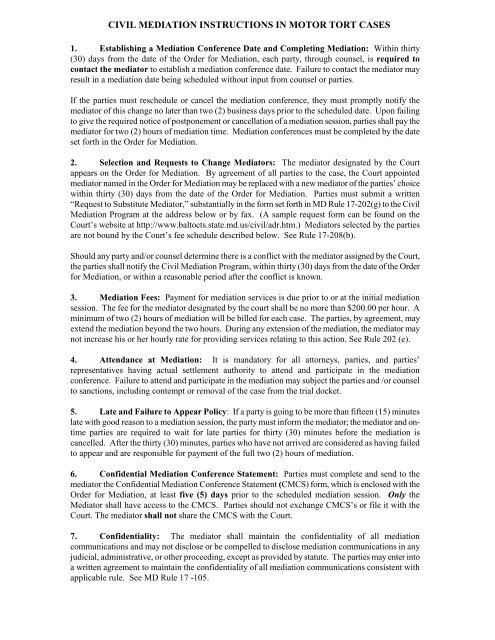Result Mediation
Pursuing a lawsuit can be costly. Using mediation, two or more people can resolve a dispute informally with the help of a neutral third person, called the mediator, and avoid expensive litigation.
The website www.resultmediation.nl and the brand are used by Result ADR B.V., Result Mediation Centre B.V. And Result ADR Family Mediation B.V. KvK: 34189768, Amsterdam BTW: NL813131418 B01 IBAN: NL97ABNA. Result Mediation Centre B.V. KvK: 55911439, Amsterdam BTW: NL851907702 B01 IBAN: NL 96 ABNA. The results suggest that these reasons are not “crucial” in the overall analysis of the possible reasons for declining mediation: only 9% attribute lack of familiarity with the program as a reason for declining mediation and almost equal proportions point out their belief that EEOC will not fully investigate the case (9%) and the fact that.
Most mediators have training in conflict resolution, although the extent of a mediator’s training and experience can vary considerably—and so can the cost. For instance, hiring a retired judge as a private mediator could cost you a hefty hourly rate. By contrast, a volunteer attorney might be available through a court-sponsored settlement conference program or the local small claims court for free.
The Role of the Mediator

Unlike a judge or an arbitrator, the mediator won’t decide the outcome of the case. The mediator's job is to help the disputants resolve the problem through a process that encourages each side to:
- air disputes
- identify the strengths and weaknesses of their case
- understand that accepting less than expected is the hallmark of a fair settlement, and
- agree on a satisfactory solution.
The primary goal is for all parties to work out a solution they can live with and trust. Because the mediator has no authority to impose a decision, nothing will be decided unless both parties agree to it. The process focuses on solving problems in an economical manner—for instance, taking into account the cost of litigation rather than uncovering the truth or imposing legal rules.
That’s not to say that the merits of the case aren’t factored into the analysis—they are. The mediator will assess the case and highlight the weaknesses of each side, the point being to hit home the risks of faring far worse in front of a judge or jury, and that the penalty or award imposed will be out of the control of the litigants.
Types of Problems Solved With Mediation
Anyone can suggest solving a problem through mediation. Neighbor-to-neighbor disputes or other personal issues can be resolved in a few hours without the need to initiate a lawsuit.
When litigation has commenced, it’s common for courts to require some form of informal dispute resolution, such as mediation or arbitration, and for a good reason—it works. Examples of cases ripe for mediation include a:
- personal injury matter
- small business dispute
- family law issue
- real estate dispute, and
The length of time it will take to solve the problem will depend on the complexity of the case. Somewhat straightforward cases will resolve in a half day. More complicated cases will require a full day of mediation, with the negotiations continuing after the mediation ends. If the mediation doesn’t settle, either side can file a lawsuit or continue pursuing the current case.
Learn about the timeline for a personal injury lawsuit.
Stages of Mediation
Many people think that mediation is an informal process in which a friendly mediator chats with the disputants until they suddenly drop their hostilities and work together for the common good. It doesn’t work this way. Mediation is a multi-stage process designed to get results. It is less formal than a trial or arbitration, but there are distinct stages to the mediation process that account for the system’s high rate of success.
Most mediations proceed as follows:
Stage 1:Mediator's opening statement. After the disputants are seated at a table, the mediator introduces everyone, explains the goals and rules of the mediation, and encourages each side to work cooperatively toward a settlement.
Stage 2:Disputants' opening statements. Each party is invited to describe the dispute and its consequences, financial and otherwise. The mediator might entertain general ideas about resolution, as well. While one person is speaking, the other is not allowed to interrupt.
Stage 3:Joint discussion. The mediator might encourage the parties to respond directly to the opening statements, depending on the participants’ receptivity, in an attempt to further define the issues.
Stage 4: Private caucuses. The private caucus is a chance for each party to meet privately with the mediator. Each side will be placed in a separate room. The mediator will go between the two rooms to discuss the strengths and weaknesses of each position and to exchange offers. The mediator continues the exchange as needed during the time allowed. These private meetings comprise the guts of mediation.
Resulti Medication Maximum Dose
Stage 5: Joint negotiation. After caucuses, the mediator might bring the parties back together to negotiate directly, but this is unusual. The mediator usually doesn’t bring the parties back together until a settlement is reached or the time allotted for the mediation ends.
Stage 6: Closure. If the parties reach an agreement, the mediator will likely put its main provisions in writing and ask each side to sign the written summary of the agreement. If the parties didn’t reach an agreement, the mediator will help the parties determine whether it would be fruitful to meet again later or continue negotiations by phone.
Find out why you should reduce your settlement to writing after your mediation.
To Learn More

Mediation Result Order
For detailed information that will guide you through the entire mediation process, get Mediate, Don't Litigate: Strategies for Successful Mediation, by Peter Lovenheim (Nolo).
NEW! Online mediation and arbitration services are available.
Contact us to learn more!
Result is dedicated to helping individuals and businesses resolve conflict and move forward in their lives by providing caring, confidential, affordable, and creative mediation and arbitration services.
We strive to treat our clients, other professionals, and each other with dignity and consideration through mutual respect, cooperation and communication.
Family Matters and Civil and Business matters, we have the solution for you.
There is no “one size fits all” approach to conflict resolution. Every family is unique and Result puts clients first by tailoring mediation and arbitration services to meet your family’s needs.
- Parental disputes
- Child Support
- Spousal Support
- Property Division
- Pre-Martial Mediation
- First Nations
- CAS
- Neighbourhood and Community Disputes
- Business partnership disputes
- Employer/employee disputes
- Contract Disputes
- First Nations
If the mediation is unsuccessful, parties are free to choose another arbitrator, or by unanimous agreement, have Result complete the arbitration.
Peter Rowe is an advanced practitioner of Alternative Dispute Resolution, specializing in high conflict mediations involving:
- Alternative Dispute Resolution
- Divorcing Families
- Partnerships
- Employment
- Probate
- Real Estate
- Commercial Disputes
- Human Rights
- Aboriginal
- Restorative Justice
Peter is a member of the Alternative Dispute Resolution Institute of Ontario (ADRIO) and past member of the Alberta Arbitration and Mediation Society (AAMS).
Result Mediation Jobs
Result offers a free initial consultation so that people can decide whether or not mediation and/or arbitration is right for them. The next stage is to design a process that meets the needs of participants and will help them resolve their dispute.
Result Mediation
No two mediations are identical. Result Mediation and Arbitration Services is dedicated to confidential, creative, and innovative approaches to assist parties in achieving fair and affordable settlements.